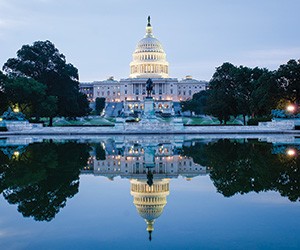U.S. Senate and House members meet regularly in chambers, committee rooms and restaurants all over The Hill and back in their districts, and there’s certainly no indication they plan to curtail or cancel those face-to-face meetings.
Yet Congress seems to have a different opinion about other government meetings. Via pending bills, lawmakers are asserting that spending and attendance at other federal government meetings should be limited, cut or sent virtual in order to save taxpayer money, in the wake of sensational media reports about lavish meetings spend by the IRS, Justice Department and other federal groups.
Though meetings industry lobbyists and advocates agree there needs to be better compliance with meetings guidelines, they and those who rely on the government sector for revenue are concerned about the long-term effects of proposed cuts and oversight.
Current Legislation
H.R. 313, the “Government Spending and Accountability Act of 2013” that would limit attendance and spending for government meetings, passed the House just before Congress recessed at the end of July. To become law, it must be approved by the Senate. A similar but separate bill to curb government spending is currently in the Senate. Among the restrictions mandated by H.R. 313 are the following: Hold spending on government meetings and travel to 70 percent of 2010 levels; no meeting can cost more than $500,000 without a waiver; and agencies can’t send more than 50 employees to an international conference.
Another meetings-specific House bill, H.R. 2643, the “Stay in Place, Cut the Waste Act of 2013,” is on the docket. It calls on the Office of Management and Budget to report on the extent to which federal agencies have reduced travel expenses by using videoconferencing, in accord with the OMB’s 2012 memo about reducing federal travel expense. The bill also calls on agencies to develop plans starting in 2017 to use videoconferencing technology to achieve a 50 percent reduction in federal agency travel expenses below FY2013 levels, or the greatest reduction in travel that the OMB director considers feasible. The bill has been referred to the House Committee on Oversight and Government Reform.
PageBreak
Telework on the Increase
The Mobile Work Exchange (MWE), a public/private partnership that advocates telework, is encouraging lawmakers to reduce meetings spend via the use of video technology.
Cindy Auten, general manager of MWE, said H.R. 2643 is a win-win on many levels.
“The bill addresses two critical areas for the government, leveraging technology to reduce costs and working smarter overall,” she says. “Leveraging the right technology can save agencies time and money. Video conference and collaboration tools are ideal not only to encourage collaboration in a mobile environment, but also to support a reduction in travel expenses.”
MWE estimates the federal government could save almost $5 billion annually by substituting video conference for face-to-face meetings and conventions, and 30 percent on its annual $15 billion spend on conference travel, according to a recent study authorized by the exchange.
Some are ahead of the lawmakers. In the face of what Society of Government Meetings Planners (SGMP) Executive Director and CEO Rob Bergeron called “a significant drop” in attendance last May at its annual conference, SGMP is already planning to use videoconferencing more.
“We do recognize that virtual meetings are on the rise, and they are an appropriate mix in the toolkit for government meetings,” Bergeron says. “Funding for education and training meetings has been reduced, and some agencies don’t have funds for travel. So we are almost obliged to use the technology in both annual and regional meetings for our 31 chapters around the country.”
Bergeron said both SGMP and the U.S. Congress value face-to-face meetings for the revenues they bring into local economies and for their usefulness to accomplish some objectives. Recent Office of Management and Budget guidelines allowing for some in-person meetings are encouraging, he says. Language in the OMB guidelines establishes that the “physical collocation of federal employees” is a necessary and cost-effective means to carry out an agency mission.
PageBreak
Industry Fallout
Meanwhile, Bergeron said SGMP supplier members are nervous about meetings cancelations and cutbacks.
“Things are very unsettled among our suppliers,” he says. “The process of booking a government meeting, and the approval process, has become more difficult, sometimes up to the secretary level. There is certainly a cloud of uncertainty over the industry.”
Nowhere in the nation is that cloud more obvious than it is to Washington, D.C.-area hotel managers, who have for years relied on the government sector for business in most any economy.
Tammy Bowser, director of sales for Arlington, Va.’s Hilton Crystal City, says Department of Defense transient traveler accounts have been a mainstay for decades. Other large hotels in her Crystal City district near the Pentagon are experiencing the same fallback.
“DOD is one of everyone’s big accounts in Crystal City,” she says. “What we are seeing is a big dropoff on the transient guest side. Many of our regulars travel all the time, but instead of weekly travel now, they are coming in once a month. Our larger hotels with lots of group business are seeing very substantial drops on that side as well.”
Also, she adds, some D.C.-area clients are restructuring their offices to encourage the use of videoconferencing, so a traveler sleeps in a local hotel but meets in the office.
To counter the drop in government meetings, Bowser and her coordinates in other Crystal City hotels are seeking more corporate and association market business, she says. The district is also stepping up marketing with a new video that promotes the Crystal City district as a good weekend destination for leisure travelers, including family groups. Incentives like room discounts during need periods, free breakfasts and parking are in the promotion mix.
Bowser and others are hopeful 2014 will present a stronger market, but they are all wondering if the current market is a “new norm” to which they must adjust.
PageBreak
Speaking Up for Meetings
A principal Washington, D.C.-based advocate for the tourism and hospitality industry is the U.S. Travel Association (USTA). As a lobbying arm of the industry, its mission is to educate and guide public policy and lawmaking.
The USTA recently issued “The Value of Government Meetings,” (http://www.ustravel.org/sites/default/files/page/2009/07/Report_GovtMeetings_June2013.pdf) a study by Rockport Analytics. The report indicated cutting government meetings too deeply would prevent government employees from doing their jobs effectively.
Erik Hansen, the USTA’s director of domestic policy, says his group is working to educate federal lawmakers about the value of face-to-face meetings. The current political climate, he says, is the biggest impediment to the process.
“Members meet every week with colleagues in Washington, D.C., and constituents back in their districts. So they certainly know in-person meetings are valuable,” he says. “However, the lingering effects of meetings rules violations by some agencies have created a toxic political climate that we have to navigate.”
With regard to videoconferencing, Hansen says the technologies may be appropriate for smaller groups of 15 or so, but for larger groups, it usually has limitations.
“What we advocate is fair and balanced policies surrounding government travel,” he says.
One way industry people can help, he adds, is to encourage their federal representatives to do “back of the house” tours in hotels, convention centers and elsewhere, to promote better understanding of meetings impact on the economy.
Hansen pointed to a “back of the house” tour Colorado Congressman Doug Lamborn took with representatives of the Colorado Springs CVB at The Broadmoor during an international four-day National Space Symposium that was attended by 9,000 people.
“I didn’t know the full extent of all the people who have to work hard and who get a paycheck for putting this together,” Lamborn told the Colorado Springs Gazette after his one-hour tour. “It’s amazing. The ripple effect throughout the local economy is just wonderful.”
Ruth A. Hill is a Washington, D.C.-area freelance writer and a frequent contributor to Meetings Focus.






